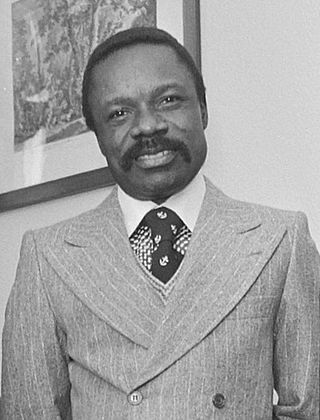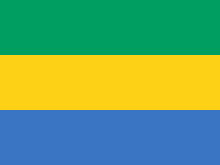Little is known of the history of Gabon before European contact. Bantu migrants settled the area beginning in the 14th century. Portuguese explorers and traders arrived in the area in the late 15th century. The coast subsequently became a centre of the transatlantic slave trade with European slave traders arriving to the region in the 16th century. In 1839 and 1841, France established a protectorate over the coast. In 1849, captives released from a captured slave ship founded Libreville. In 1862–1887, France expanded its control including the interior of the state, and took full sovereignty. In 1910 Gabon became part of French Equatorial Africa and in 1960, Gabon became independent.

Omar Bongo Ondimba was a Gabonese politician who was the second president of Gabon from 1967 until his death in 2009. Bongo was promoted to key positions as a young official under Gabon's first President Léon M'ba in the 1960s, before being elected the second vice-president in his own right in 1966. In 1967, he succeeded M'ba to become the country's president, upon the latter's death.
Jean-François Ntoutoume Emane is a Gabonese politician who was Prime Minister of Gabon from 23 January 1999 to 20 January 2006. He was Mayor of Libreville, the capital, from 2008 to 2014.
Paul Mba Abessole is a Gabonese politician who heads the National Woodcutters' Rally – Rally for Gabon and was a leading opponent of President Omar Bongo during the 1990s. He stood as a presidential candidate twice during the 1990s and also served as Mayor of Libreville, the capital. From 2002 to 2009 he served in the government of Gabon, holding the rank of Deputy Prime Minister for most of that period.

Ali Bongo Ondimba, also known as Ali Bongo and Ali Ben Bongo, is a Gabonese former politician who was the third president of Gabon from 2009 to 2023. He is a member of the Gabonese Democratic Party. He is the son of Omar Bongo, who was president of Gabon from 1967 until his death in 2009. During his father's presidency, he was Minister of Foreign Affairs from 1989 to 1991, represented Bongoville as a deputy in the National Assembly from 1991 to 1999, and was the Minister of Defense from 1999 to 2009. After his father's death, he won the 2009 Gabonese presidential election. He was reelected in 2016, in elections marred by numerous irregularities, arrests, human rights violations, and post-election protests and violence.

Jean Eyeghé Ndong is a Gabonese politician. He was the Prime Minister of Gabon from January 20, 2006 to July 17, 2009. He was also the First Vice-president of the Gabonese Democratic Party (PDG) until 2009.
Didjob Divungi Di Ndinge is a Gabonese politician who was Vice-President of Gabon from 1997 to 2009. He is the President of the Democratic and Republican Alliance (ADERE), a political party. As Vice-President of Gabon, Divungi Di Ndinge exercised presidential powers in an acting capacity from May 2009 to June 2009, while President Omar Bongo Ondimba was hospitalized.

Laure Olga Gondjout is a Gabonese politician. She served in the government of Gabon as Minister of Communication and Telecommunications from 2007 to 2008, as Minister of Foreign Affairs in 2008, and again as Minister of Communication and Digital Economy from 2008 to 2011. Subsequently she was Secretary-General of the Presidency from 2011 to 2014. She has served as Ombudsman from February 2014 to January 2019

Franco-Gabonese relations are the current and historical relations between France and Gabon. Both nations are members of the Organisation internationale de la Francophonie and the United Nations.
André Mba Obame was a Gabonese politician. After serving as an adviser to President Omar Bongo in the 1980s, he was a minister in the government of Gabon from 1990 to 1991 and again from 1997 to 2009; during that time, he was identified with the reformist wing of the ruling Gabonese Democratic Party (PDG). He held the key post of Minister of the Interior from 2006 to 2009 and then briefly served as Minister of the Coordination and Follow-up of Government Action in mid-2009. He was an independent candidate in the 30 August 2009 presidential election and placed third with 25.33% of the vote, according to official results, but he claimed victory and alleged that the PDG candidate, Ali Bongo, won through fraud.
Pierre-André Kombila Koumba is a Gabonese politician, professor, and medical doctor. He was the First Secretary of the National Rally of Woodcutters (RNB), Gabon's main opposition party, from 1990 to 1998; he then led a split from the RNB, establishing the more radical National Rally of Woodcutters - Democrats (RNB-D) in 1998. He was nominated as the RNB-D's candidate for the 1998 presidential election, but received only a small share of the vote. Later, he abandoned his opposition to President Omar Bongo and joined the government, serving as Minister of Technical and Vocational Education from 2006 to 2009 and as Minister of Hydraulic Resources and New Energies in 2009. Following Bongo's death, he rejoined the opposition in mid-2009.
Jean-Boniface Assélé is a Gabonese politician and the President of the Circle of Liberal Reformers (CLR). He served in the government of Gabon from 1975 to 1990 and again from 2004 to 2009. He was also Commander-in-Chief of the National Police Forces from 1970 to 1989 and held the rank of General. Since September 2009, Assélé has been the Fourth Vice-President of the Senate of Gabon.
Jules-Aristide Bourdes-Ogouliguende was a Gabonese politician who was the President of the Congress for Democracy and Justice (CDJ), an opposition party. He served as a minister in the government of Gabon from 1976 to 1990 and was President of the National Assembly from 1990 to 1993; from 1993 until his death in 2018.

Rose Francine Rogombé She was a Gabonese politician who was acting president of Gabon from June 2009 to October 2009, following the death of long-time President Omar Bongo. She constitutionally succeeded Bongo due to her role as president of the Senate, a post to which she was elected in February 2009. She was a lawyer by profession and a member of the Gabonese Democratic Party (PDG). Rogombé was the first female head of state of Gabon. After her interim presidency, she returned to her post as President of the Senate.

Édith Lucie Bongo Ondimba was the First Lady of Gabon as the wife of President Omar Bongo from 1989 to 2009.

Early presidential elections were held in Gabon on 30 August 2009. They took place due to the death of incumbent President Omar Bongo on 8 June, after more than 41 years as the sole president of Gabon. While the constitution stated that interim President Rose Francine Rogombé should organise elections within 30 to 45 days, the Constitutional Court accepted the government's request for a delay due to the circumstances.
Léonard Andjembé is a Gabonese politician and professor. He is currently the First Vice-president of the Senate of Gabon, and he was the Senate's Interim President for several months in 2009.

Paul Biyoghé Mba is a Gabonese politician who was Prime Minister of Gabon from July 2009 to February 2012. A member of the Gabonese Democratic Party (PDG), he served for years as a minister in the government prior to his appointment as Prime Minister. From 2012 to 2015, he was President of the Economic and Social Council of Gabon, and he has again served in the government as First Deputy Prime Minister for Health since 2015.
The African nation of Gabon has had human inhabitants for perhaps 400,000 years. Bantu peoples settled here from the 11th century. The coastline first became known to Europeans through Portuguese and Dutch sailors. Colonised by the French in the 19th century, Gabon became independent in 1960.
Events in the year 2009 in Gabon.











